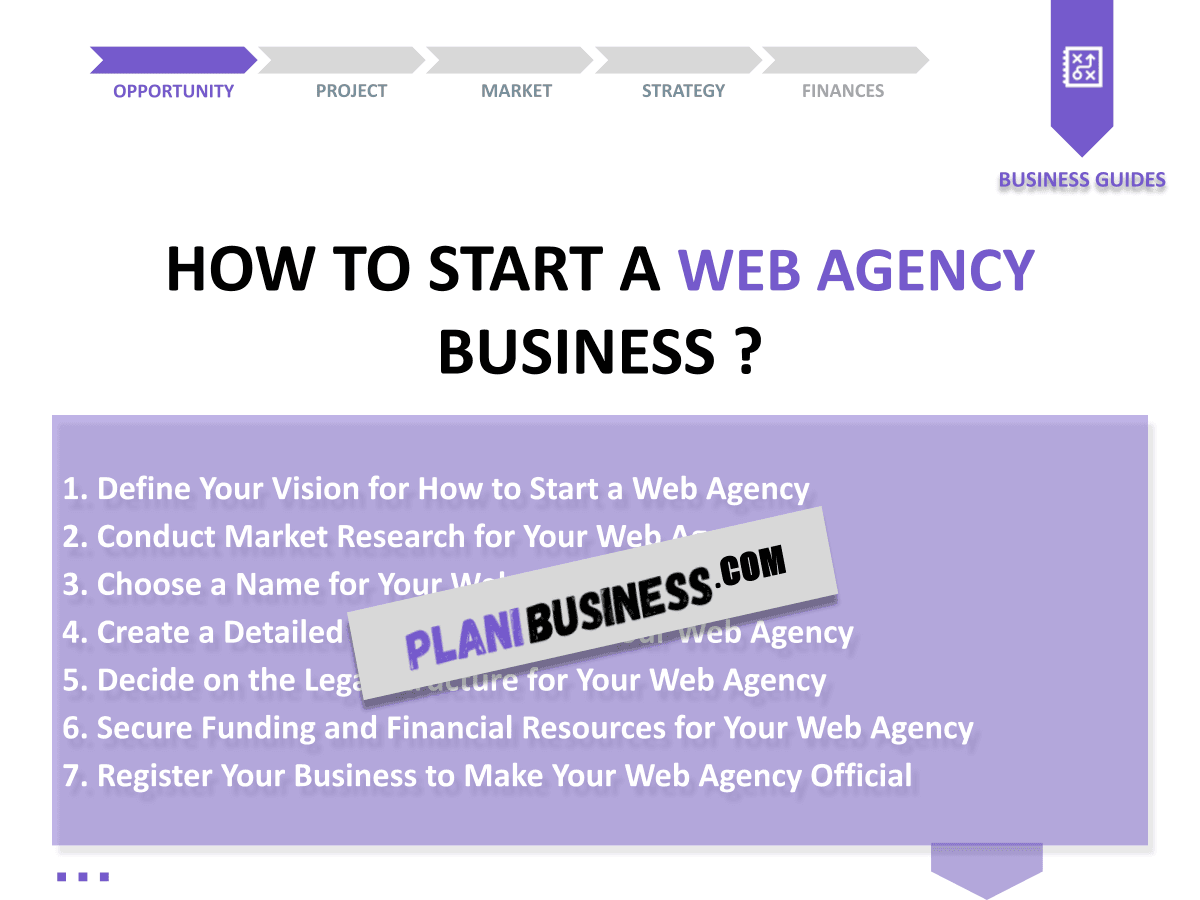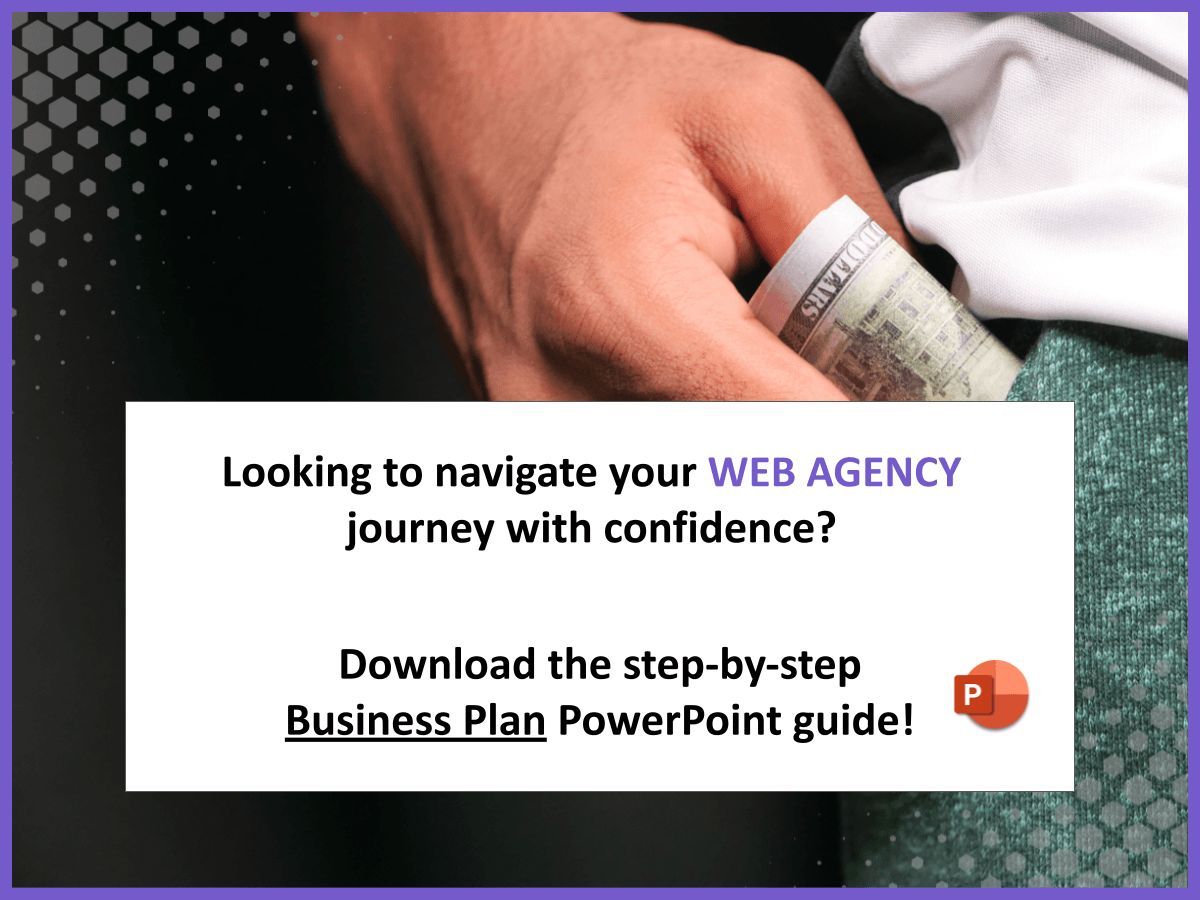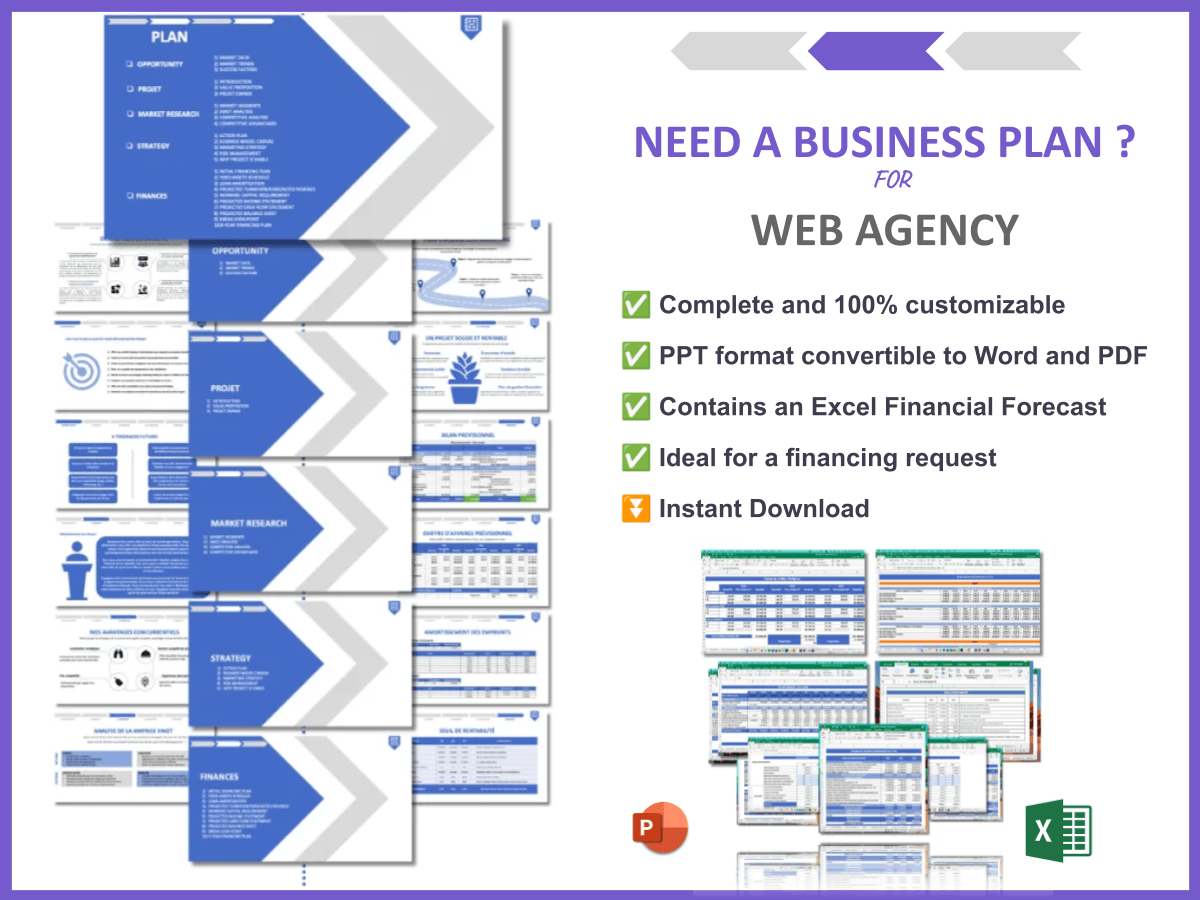Are you thinking about starting a web agency? You’re not alone! Many aspiring entrepreneurs are eager to dive into the world of digital services, and the potential for success is enormous. In fact, the web development and design industry is projected to grow by over 10% in the next few years. This presents a fantastic opportunity for you to carve out your niche and create a thriving business. How to Start a Web Agency is not just about offering services; it’s about establishing a brand that resonates with clients and stands out in a competitive market.
In this guide, we’ll cover everything you need to know to launch your web agency successfully:
- Defining your vision and services
- Conducting market research
- Choosing a catchy name
- Creating a detailed business plan
- Deciding on a legal structure
- Marketing your agency effectively
1. Define Your Vision for How to Start a Web Agency
Before diving into the nitty-gritty of starting a web agency, it’s crucial to clarify your vision. What services do you want to offer? Who is your target audience? This is your chance to brainstorm and jot down ideas. I always suggest creating a mood board or a vision board. It really helps in visualizing what you want to achieve!
Consider the following questions to refine your vision:
- What are your strengths and weaknesses?
- What problems can you solve for your clients?
- What unique value will you bring to the market?
Think about what makes your agency unique. Is it your design style, your approach to client relations, or perhaps your expertise in a specific niche? This clarity will guide your decisions moving forward.
2. Conduct Market Research for Your Web Agency
Understanding the market is vital. Research your competitors and identify what they do well and where they fall short. This will help you find your edge.
Here’s a simple table comparing your potential competitors:
| Competitor | Strengths | Weaknesses |
|---|---|---|
| Competitor A | Strong branding | High prices |
| Competitor B | Wide range of services | Poor customer service |
Also, look at industry trends. Are there emerging technologies or design styles that you could incorporate into your offerings? For instance, the rise of AI tools in web design could offer new ways to enhance your services. Additionally, consider surveying potential clients to understand their needs better. This direct feedback can be invaluable in shaping your service offerings.
3. Choose a Name for Your Web Agency
Your agency name is your first impression. It should be catchy, memorable, and relevant to your services. You want it to resonate with your target audience and reflect the essence of what you do.
Here are some tips for choosing the perfect name:
- Keep it short and simple: A concise name is easier to remember.
- Make it descriptive: Choose words that hint at your services, like “design,” “digital,” or “creative.”
- Check for availability: Ensure the domain name is available to match your agency’s name.
Consider using a name generator tool if you’re stuck. It can spark ideas you might not have thought of! Once you have a shortlist, test it out with friends or potential clients to gauge their reactions. Their feedback can help you make the final decision.
4. Create a Detailed Business Plan for Your Web Agency
A well-thought-out business plan is your roadmap. It outlines your goals, strategies, and financial projections. This document is not just for you; it can also be used to attract potential investors or partners.
I recommend checking out this business plan template for Web Agency. It’s super detailed and can save you a ton of time! Here’s what your business plan should typically include:
| Section | Description |
|---|---|
| Executive Summary | Overview of your business, mission statement, and what you aim to achieve. |
| Market Analysis | Insights on your target market, competition, and industry trends. |
| Services Offered | Detailed description of the services you will provide, including pricing models. |
| Marketing Strategy | How you plan to attract and retain clients, including online and offline strategies. |
| Financial Projections | Estimated income, expenses, and profitability over the next few years. |
Creating a business plan might seem daunting, but breaking it down into sections can make it manageable. Plus, it forces you to think critically about each aspect of your agency, ensuring you’re well-prepared for the journey ahead. Remember, your business plan is a living document; revisit and update it as your agency grows and evolves.
5. Decide on the Legal Structure for Your Web Agency
Choosing the right legal structure for your web agency is crucial for liability and tax purposes. Whether it’s a sole proprietorship, LLC, or corporation, each has its pros and cons that can significantly impact your business.
Here’s a quick overview of common legal structures:
| Structure | Pros | Cons |
|---|---|---|
| Sole Proprietorship | Easy to set up; full control over decisions | Unlimited personal liability |
| Limited Liability Company (LLC) | Limited liability; flexible taxation options | More paperwork than a sole proprietorship |
| Corporation | Limited liability; easier to raise capital | Complex structure; double taxation on profits |
Consult with a legal professional to ensure you’re making the right choice based on your specific needs and future goals. This step can save you headaches down the road, especially if you decide to expand your business or bring on partners.
6. Secure Funding and Financial Resources for Your Web Agency
Determining how much capital you’ll need to start your agency is essential. Consider your startup costs, including tools, software, and marketing expenses. A well-prepared budget will help you manage your finances effectively.
Here are some common funding options to explore:
- Personal Savings: Using your own funds can be a straightforward way to get started.
- Bank Loans: Traditional loans can provide substantial capital but often require a solid business plan.
- Investors: Bringing in investors can provide funding in exchange for equity, but it may dilute your ownership.
- Crowdfunding: Platforms like Kickstarter or Indiegogo can help you raise funds from the public.
Each funding option has its advantages and disadvantages, so carefully consider which is best for your situation. For instance, if you opt for investors, ensure that their vision aligns with yours to avoid future conflicts. It’s crucial to have a solid financial foundation to support your agency’s launch and growth.
7. Register Your Business to Make Your Web Agency Official
Once you’ve settled on a name and structure, it’s time to register your business. This step legitimizes your operations and allows you to operate legally. Registering your business is essential for building credibility with clients and partners.
The process typically involves the following steps:
- Choose a Business Name: Ensure it’s unique and reflects your brand.
- File the Necessary Paperwork: Depending on your legal structure, this may include Articles of Incorporation or a Doing Business As (DBA) registration.
- Pay Registration Fees: Be prepared to pay a fee, which can vary based on location and business type.
- Obtain an Employer Identification Number (EIN): This is necessary for tax purposes and hiring employees.
Check with your local government or a business advisor for specific registration requirements in your area. This step may seem tedious, but it’s crucial for establishing your agency on solid legal ground.
8. Obtain Necessary Licenses and Permits for Your Web Agency
Depending on your location and the services you offer, you may need specific licenses or permits to operate legally. Research what’s required in your area to avoid any legal issues that could hinder your agency’s growth.
Here’s a quick checklist of common permits and licenses you might need:
- Business License: Required by most local governments to operate legally.
- Sales Tax Permit: Necessary if you’re selling products or services that are taxable.
- Professional Licenses: May be required for specific services, such as web development or graphic design.
Additionally, consider consulting with a legal expert or local business bureau to ensure you have all the necessary paperwork in order. This will help you focus on building your agency without the worry of compliance issues hanging over your head.
9. Set Up Your Financial Management Systems for Your Web Agency
Establishing a reliable financial management system is essential for tracking income and expenses. This will not only help you maintain a clear picture of your agency’s financial health but also prepare you for tax season.
Here are some key components to consider when setting up your financial management systems:
- Accounting Software: Tools like QuickBooks or FreshBooks can simplify invoicing and expense tracking.
- Bank Accounts: Open a separate business bank account to keep personal and business finances distinct.
- Budgeting: Create a budget to manage your spending and ensure you allocate resources effectively.
Consider creating a simple table to help visualize your budget:
| Category | Estimated Monthly Expense | Actual Monthly Expense |
|---|---|---|
| Office Supplies | $200 | |
| Marketing | $500 | |
| Software Subscriptions | $300 |
Regularly review your financial reports to make informed decisions about your agency’s direction. This proactive approach will help you avoid financial pitfalls and set your agency up for long-term success.
10. Establish Your Brand Identity for Your Web Agency
Your brand identity is how your agency is perceived in the marketplace. It encompasses everything from your logo and color scheme to your messaging and tone of voice. Establishing a strong brand identity is crucial for standing out in a crowded market.
To create a compelling brand identity, consider the following:
- Logo Design: Hire a professional designer or use tools like Canva to create a unique logo that reflects your brand.
- Brand Colors: Choose a color palette that resonates with your target audience and is consistent across all platforms.
- Brand Voice: Define how you communicate with your clients. Are you formal and professional, or casual and friendly?
It can be helpful to develop a branding guide that outlines these elements. This ensures consistency across all your marketing materials, from your website to social media channels. A cohesive brand identity will not only attract clients but also build trust and loyalty over time.
11. Develop a Professional Website for Your Web Agency
Your website is your online portfolio and a critical tool for attracting clients. It should not only showcase your work but also clearly outline your services and convey your brand identity. A well-designed website can significantly enhance your credibility and help you stand out in the competitive landscape of web agencies.
Here are some essential elements to include on your website:
- Portfolio: Showcase your best work to demonstrate your skills and attract potential clients.
- Service Descriptions: Clearly outline what services you offer, including pricing models if applicable.
- Contact Information: Make it easy for clients to reach you by providing multiple contact methods.
Consider the following table to help organize your website content:
| Page | Content | Purpose |
|---|---|---|
| Home | Overview of services and value proposition | Capture visitor interest and encourage exploration |
| Portfolio | Examples of previous work | Showcase skills and attract new clients |
| About Us | Background information and team bios | Build trust and establish credibility |
Incorporate SEO best practices to improve your visibility in search engines. Use relevant keywords throughout your content, optimize your images, and ensure your website is mobile-friendly. This will help potential clients find you more easily!
12. Market and Advertise Your Web Agency
Once your agency is up and running, it’s time to market it effectively. Utilize a combination of online and offline strategies to reach your target audience and grow your client base.
Here are some effective marketing strategies for your web agency:
- Social Media Marketing: Use platforms like Facebook, LinkedIn, and Instagram to showcase your work and engage with potential clients.
- Content Marketing: Start a blog on your website to share valuable insights and establish your authority in the industry.
- Email Marketing: Build an email list to keep in touch with past clients and inform them about your services and promotions.
Don’t forget about networking! Attend industry events and join online communities to connect with potential clients and other professionals. Building relationships can lead to referrals and new opportunities.
13. Assemble Your Team for Your Web Agency
As your agency grows, you may need to bring in additional help. Whether it’s freelancers or full-time employees, building a solid team is crucial for your success. A strong team can help you deliver high-quality services and manage your workload effectively.
When assembling your team, consider the following:
- Identify Required Skills: Determine what skills you need to complement your own and fill gaps in your offerings.
- Hire for Culture Fit: Look for individuals who share your vision and values to create a cohesive work environment.
- Use Freelancers Wisely: If you don’t need full-time staff, consider hiring freelancers for specific projects.
Creating a positive work culture can also enhance team performance. Foster open communication, provide opportunities for professional development, and recognize individual contributions. This approach will not only help retain talent but also contribute to your agency’s overall success.
Starting a web agency can be an exciting journey. With the right preparation and strategy, you can create a successful business that thrives in the digital landscape!
Conclusion
Starting a web agency is an exciting venture that opens up numerous opportunities in the digital landscape. By following the steps outlined in this guide, from defining your vision to assembling a talented team, you can set the foundation for a successful business. Remember, the journey may have its challenges, but with determination and the right strategies, you can achieve your goals.
For further insights, check out our articles on how to create a SWOT Analysis for Web Agency and how to formulate a Web Agency Marketing Plan with Example. These resources will provide you with valuable tools to enhance your agency’s strategic planning and marketing efforts.
FAQ
- What is a web agency? A web agency is a business that specializes in providing services related to web design, development, and digital marketing. They help clients establish an online presence and improve their digital strategies.
- How much does it cost to start a web agency? The cost of starting a web agency can vary widely depending on factors like location, services offered, and initial setup costs. On average, you might expect to invest anywhere from $5,000 to $20,000 to get started.
- Do I need a degree to start a web agency? While a degree in a relevant field can be beneficial, it is not strictly necessary. Many successful web agency owners are self-taught or have gained experience through freelance work.
- How do I find clients for my web agency? Finding clients can involve a mix of networking, online marketing, and referrals. Consider leveraging social media, attending industry events, and optimizing your website for search engines to attract potential clients.
- What services should I offer as a web agency? Common services include web design, web development, SEO, digital marketing, branding, and content creation. Tailor your offerings based on your expertise and market demand.
- How can I differentiate my web agency from competitors? To stand out, focus on a niche market, develop a unique value proposition, and deliver exceptional customer service. Building a strong brand identity can also help attract clients.
- What tools do I need to run a web agency? Essential tools include project management software, design tools (like Adobe Creative Suite), web development platforms (like WordPress), and accounting software for financial management.
- How do I price my services? Pricing can depend on various factors, including your experience, the complexity of the project, and market rates. Research your competitors and consider offering tiered pricing packages to appeal to different clients.
- What should I include in my web agency’s portfolio? Your portfolio should showcase your best work, including case studies, client testimonials, and a diverse range of projects that highlight your skills and expertise.
- How can I market my web agency effectively? Utilize a mix of online marketing strategies, such as social media marketing, content marketing, and email campaigns. Networking and attending industry events can also help you reach potential clients.







